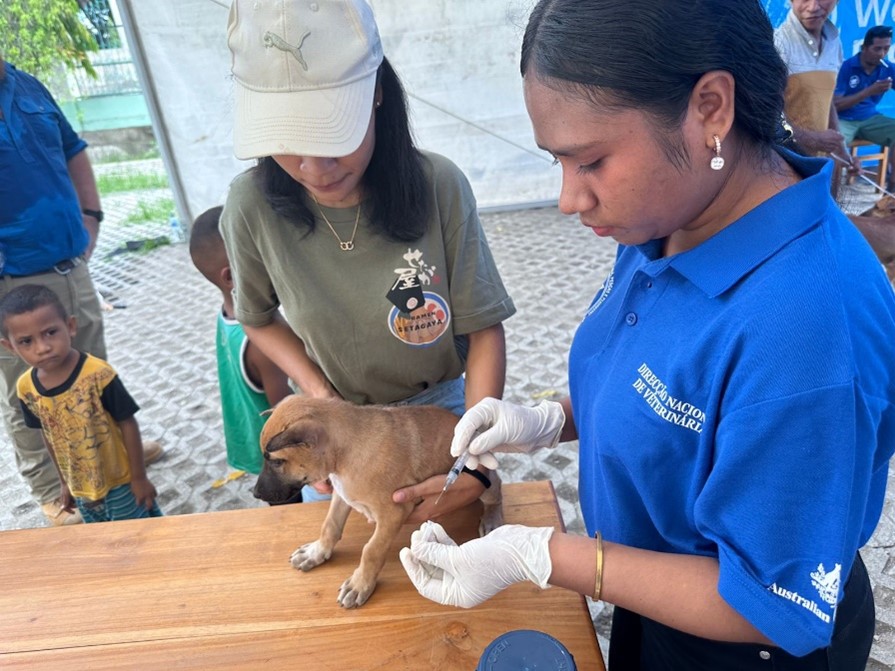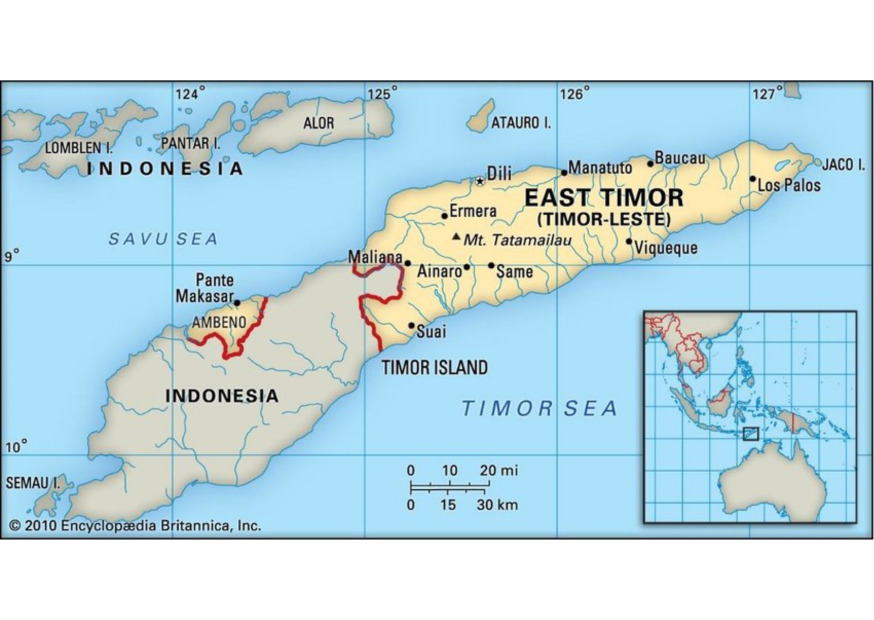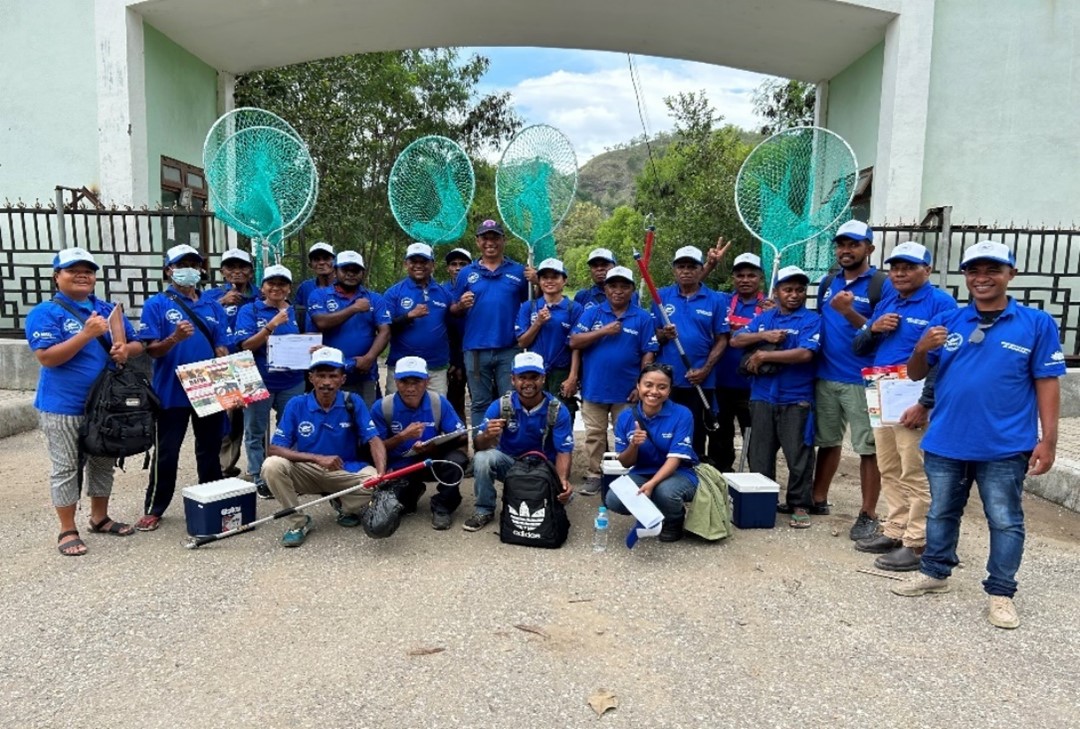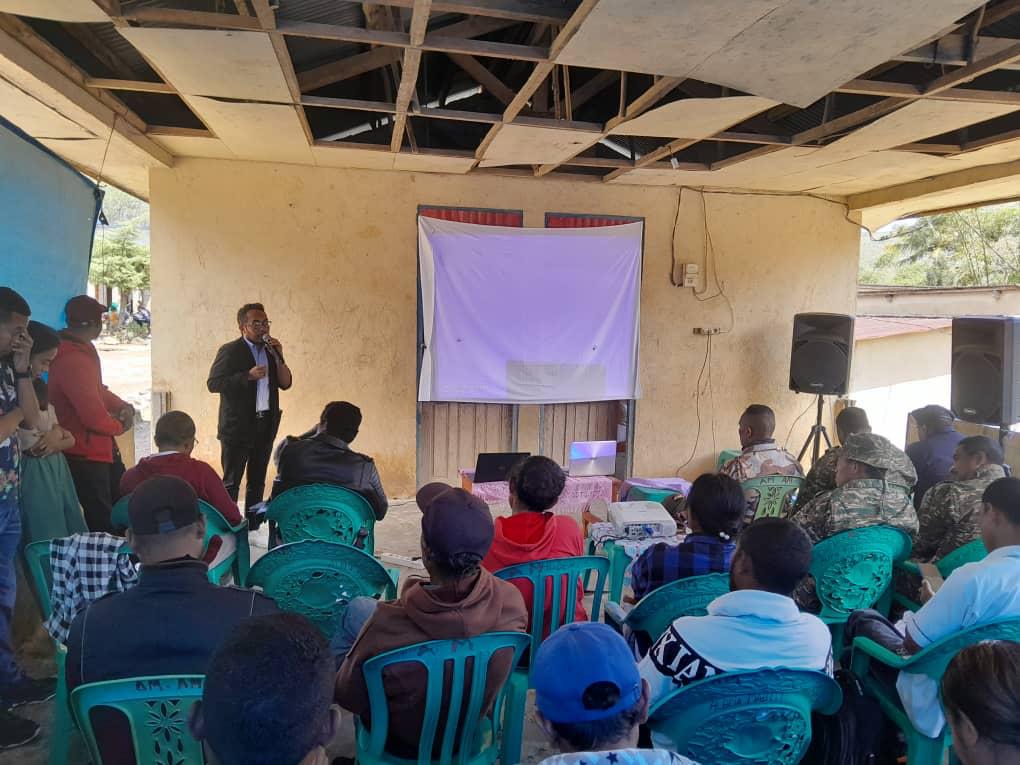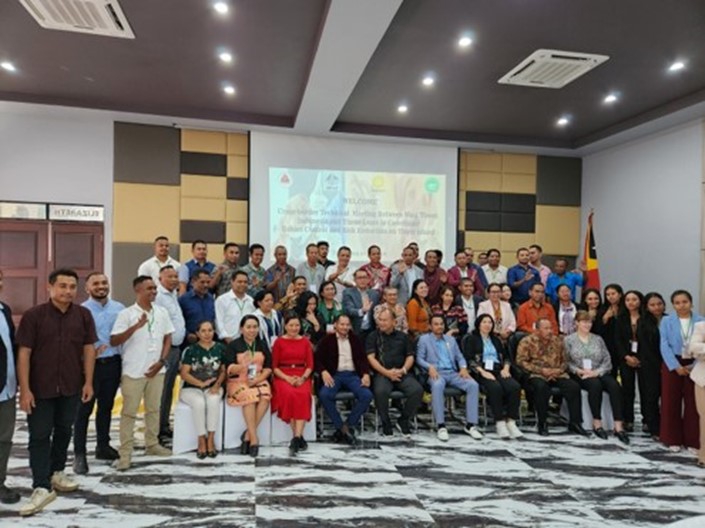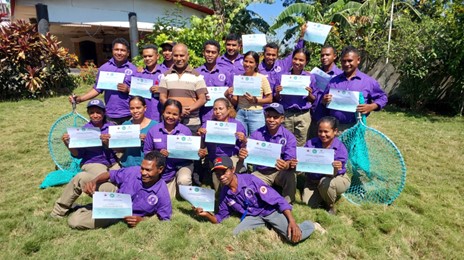Timor-Leste has a historical record of being rabies-free in its dog population. However, in May 2023 an outbreak in the Indonesian part of Timor Island prompted pre-emptive preparedness plans and response activities by the Veterinary Services of Timor-Leste, which significantly slowed the spread of dog-mediated rabies into Timor-Leste.
Map of Timor Island
Timor-Leste shares a porous 253 km land border with Indonesia, including the exclave of Oecusse on the island of Timor, with frequent cross-border movement and trade between culturally connected communities in both countries. The first cases of dog-mediated rabies and associated human fatalities on Timor Island were reported in West Timor (Indonesia) in May 2023. Along with strengthened border surveillance, Timor-Leste authorities initially procured 50,000 doses of animal rabies vaccines through the World Organisation for Animal Health (WOAH) vaccine bank with the support of the Australian government. Between January and June 2024, a first round of a pre-emptive mass animal rabies vaccination campaign was implemented in Oecusse, Bobonaro, Covalima municipalities (all bordering Indonesia) and the capital, Dili. Over 45,000 animals, predominantly dogs (92%) and cats (8%) were vaccinated. The campaign reached an estimated vaccination coverage rate of ~50% of the dog population for all vaccinated municipalities, with several border sub-districts achieving over 70% vaccination coverage of the dog population. This represents a remarkable achievement for a small Veterinary Services workforce during a first ever mass animal rabies vaccination campaign under challenging operational field conditions.
Simultaneously, a National Rabies Incident Management Team (IMT) was established. Veterinary Services operate in at-risk municipalities to conduct disease investigations, public awareness campaigns, treatments, and vaccinations. Police, customs officials, military personnel, healthcare providers, community leaders, farmers and the dog-owning public participated in these joint public awareness efforts.
Despite pre-emptive preparedness and response activities, dog-mediated rabies remains a challenging disease to contain. Several factors, including limited canine population control and a high rate of dog population turnover, challenging geography and limited community awareness create long-term challenges for achieving sustained vaccination coverage rates over 70% in the dog population.
In March 2024, the first reported case dog rabies and a human rabies fatality was reported in Oecusse municipality, which was notified to WOAH and World Health Organization (WHO), respectively. In June 2024, the first dog rabies cases were reported in Bobonaro municipality. This represented the first ever incursion of dog-mediated rabies into the main part of Timor-Leste. In July 2024, additional dog rabies cases were reported from Covalima municipality. Dog cases continue to be reported in all three rabies-affected municipalities.
The Veterinary Services of Timor-Leste have since increased their efforts to address the long-term challenges posed by dog-mediated rabies.
In June 2024, Timor-Leste hosted a cross-border technical coordination meeting with West Timor (Indonesia) to coordinate rabies control & risk reduction on Timor Island. The meeting enjoyed high-level political & technical representation, including the Chief Veterinary Officer (CVO) of the National Veterinary Directorate of Timor-Leste, and the Director General of Livestock and Animal Health Services of Indonesia. With support from WOAH and the Australian government, the meeting resulted in a signed statement of bilateral collaboration, including the intention to hold quarterly cross-border coordination meetings and share information on surveillance, integrated bite case management (IBCM) and coordinated vaccination and public awareness campaigns.
As long-term partners in regional animal health, veterinarians and animal health officers from Timor-Leste and Australia have worked side by side to support the National Rabies IMT. As part of the training support, 12 veterinary officers completed three training certificates offered by the Global Alliance for Rabies Control Education Platform on rabies education, animal handling and vaccination, and dog welfare. The Timor-Leste CVO and Ministry of Health (MoH) colleagues attended the Asia Pacific Rabies Prevention and Control workshop hosted by WOAH in Bangkok from 16–18 July 2024. The workshop offered a valuable opportunity to learn from other countries’ experience and allowed Timor-Leste to showcase its national rabies prevention and control initiatives. The experience underscored the importance of Timor-Leste developing a National Strategic Plan for dog-mediated rabies control.
In August 2024, the Timor-Leste Veterinary Services officers teamed up with Australian partners to collaboratively develop and deliver comprehensive rabies-focused Municipal Animal Health Officer training. 32 municipal animal health officers in two rabies-affected municipalities completed 40 hours of face-to-face practical training in animal handling and medicines, work health and safety, biosafety and biosecurity principles, record keeping, public awareness, data collection, rabies field diagnostic testing, case investigation and tracing.
“The dog-mediated rabies outbreak situation on Timor Island has challenged the Timor-Leste animal and human health sectors’ preparedness, response, training, logistical and operational capabilities and workforce capacities to respond to zoonotic health threats. However, we are very proud our initial success in delaying cross-border spread and then containing dog-mediated rabies to border municipalities. With continued support from our multilateral partners, the Government of Timor-Leste is committed to implementing a National Strategic Plan with short, medium and long-term objectives to achieve a goal of eliminating dog-mediated rabies deaths from Timor-Leste in line with the “Zero by 30” global strategic plan.”
Next steps toward achieving the “Zero by 30” goal
In June 2024, a second consignment of 50,000 animal rabies vaccines (from a total of 200,000 funded by Australia through the WOAH vaccine bank) arrived in Dili. Phased implementation of a second round of mass animal vaccination commenced in July 2024 in key risk areas.
For World Rabies Day, Timor-Leste has targeted rabies-affected border municipalities for events including a public awareness campaign and a mass animal vaccination campaign at several key border transit points.
From September 2024 the Timor-Leste government Ministries of Agriculture, Health and Education will work with WOAH, WHO and Australian partners to develop a National Strategic Plan (NSP) for dog-mediated rabies control to guide future planning and investment. With Australian support, from October 2024 a risk communication and community engagement (RCCE) specialist will embed within the National Rabies IMT for 3 months to support development of a comprehensive, multi-sectoral risk communications strategy and public awareness campaign in partnership with human health, animal health and education sectors.
